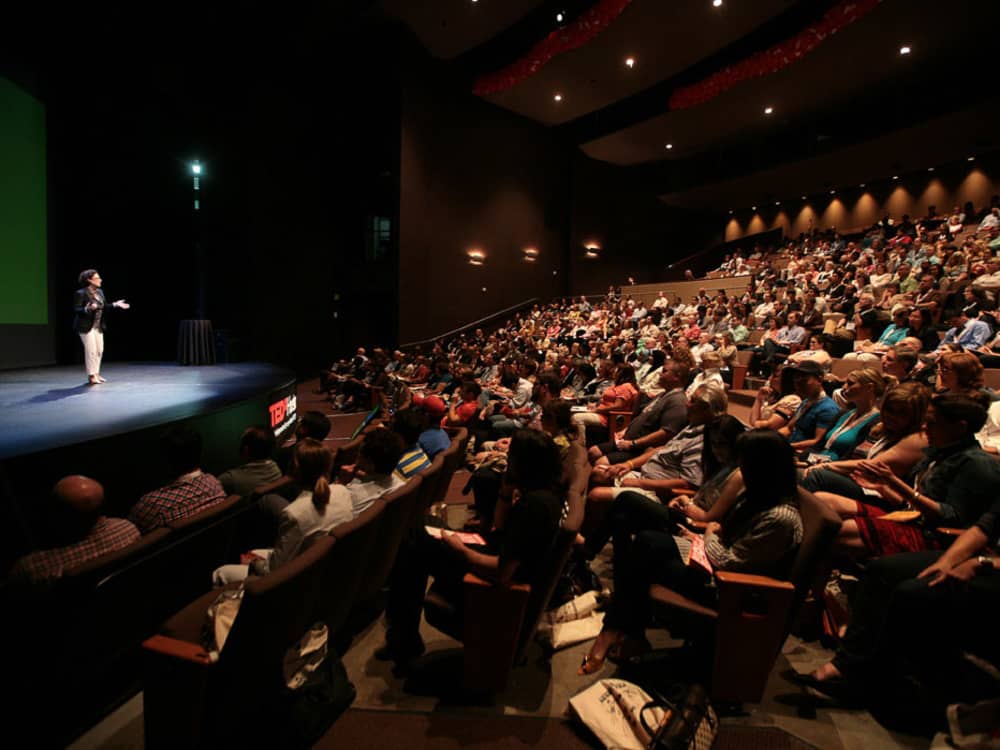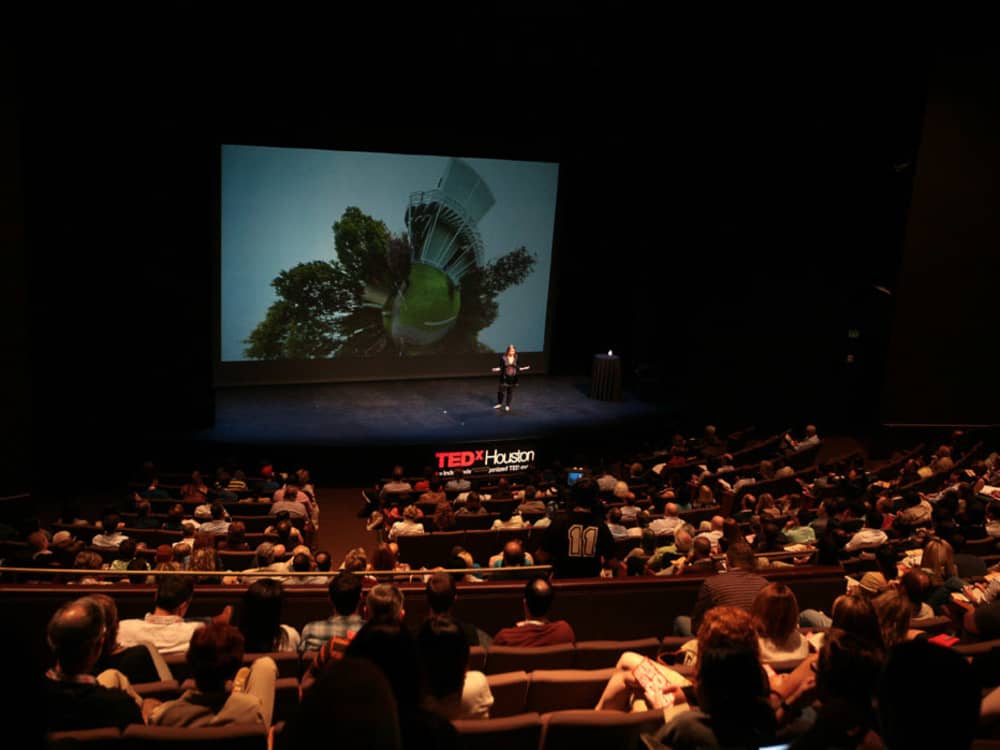Challenge Your Thinking
Ideas attack: My journey inside a bigger, better TEDx Houston
 Emcee Chris Johnson and TEDx curators and volunteers celebrate the beginning ofjourney that began with "ideas worth spreading" at TEDx Houston 2011.Photo by Ed Schipul/TEDxHouston
Emcee Chris Johnson and TEDx curators and volunteers celebrate the beginning ofjourney that began with "ideas worth spreading" at TEDx Houston 2011.Photo by Ed Schipul/TEDxHouston Director of sustainability Laura Spanjian was positively unapologetic in hermission to continue to green up Houston.Photo by Christine Tremoulet/TEDxHouston
Director of sustainability Laura Spanjian was positively unapologetic in hermission to continue to green up Houston.Photo by Christine Tremoulet/TEDxHouston Neighborhood Centers CEO and president Angela Blanchard moved the audience totears with her philosophy on helping people, beginning with the positive. "Wemay not share a past. But we can share a future."Photo by Ed Schipul/TEDxHouston
Neighborhood Centers CEO and president Angela Blanchard moved the audience totears with her philosophy on helping people, beginning with the positive. "Wemay not share a past. But we can share a future."Photo by Ed Schipul/TEDxHouston Each balloon had a challenge meant to extend the TEDx experience beyond aninspiring conference.Photo by Ed Schipul/TEDxHouston
Each balloon had a challenge meant to extend the TEDx experience beyond aninspiring conference.Photo by Ed Schipul/TEDxHouston Houston artist Carrie Schneider spoke of her project "Hear Our Houston." Aseries of guided walking tours, Schneider's initiative strives to archiveHouston's geographical history with personal stories.Photo by Christine Tremoulet/TEDxHouston
Houston artist Carrie Schneider spoke of her project "Hear Our Houston." Aseries of guided walking tours, Schneider's initiative strives to archiveHouston's geographical history with personal stories.Photo by Christine Tremoulet/TEDxHouston
Selfish selflessness explains that giving is not a sacrifice but a misunderstood activity that gives back synergistically. A pastor who hates religion when it's used to impose antiquated ideas on modern lifestyle. Democracies failing to support initiatives that would ensure their legacy and survival.
Those were some of the paradigm-shifting ideas worth spreading heard at the second TEDx Houston conference Saturday at University of Houston's Lyndall Finley Wortham Theatre. An inspired crowd of 500-plus packed the hall and was not afraid to laugh, cry, cheer and show enthusiasm through several standing ovations. The dynamic buzz was overwhelming and free of apathy.
The audience at TED events is curated and applications to attend TEDx Houston 2011 grew exponentially in number and diversity from last year.
For those who did not make the cut nor could be present, the conference was streamed live. Missed it? No worries. The videos will be released shortly.
TEDx forums are independently organized conferences licensed by TED — meaning technology, entertainment and design. The national parent organization lends its signature format and leaves the programming to the local curators.
Culture Pilot's foursome — Tim DeSilva, Kara Matheny, Javier Fadul and Grace Rodriguez — and an arsenal of volunteers kept the logistically complex event running like a well-oiled machine and effortlessly facilitated 18-minute emotionally-charged lectures from 16 speakers, three performers and a few unscripted moments.
Themed "Where do we go from here?" the content was intended to act as a catalyst, a call to action, a plea for change and activism. So much so that District H council member and Vice Mayor Pro-Tem Ed Gonzalez proclaimed Saturday TEDx Houston Day on behalf of Mayor Annise Parker.
Emcee and KUHA host Chris Johnson challenged everyone to listen with intent. Imagine you are on a plane, he suggested. Everyone tunes out when a flight attendant reviews plane security procedures. But if the plane was going down? Would you pay attention?
"Listen as if the plane was going down," he said. We laughed.
In a morning-after enlightened slumber, I reminisce on some of the ideas that will haunt me and replay in my head, day after day.
After a colleague suggested her work was not breaking boundaries, Roberta Ness, dean at the University of Texas School of Public Health, began an impassioned research project on creativity. In seeking an explanation and a solution to America's decline in scientific innovation output, Ness wanted to know if creativity was innate, or whether it could be taught and nurtured.
Ness suggests there is a low creativity epidemic in the nation's youth. The pattern is in sharp contrast to the rising scores on standardized intelligence tests. Meaning? Students are better at passing a test but do not know how to come up with ideas on their own.
Well designed programs that practice the breaking of frames (an expected set of rules through which we interpret the world), critical observation and changing points of view can improve holistic and creative thinking.
Camp For All director Kurt Podeszwa works with children with disabilities and sees those differences as opportunities to enrich his own life. As a Rotary Club member and former Marine, Podeswa wants us to understand the difference between sacrifice — embodied by a film of teenager Bradon who risked his life protecting his younger brother from a car fire — and the idea of giving with the explicit intent of getting back.
"Selfish selflessness" integrates this seemingly disparate duality and explains that when we are inclined to say "it takes a special person to do what you do," we are misunderstanding the mechanics of volunteerism.
Houston artist Carrie Schneider wants you to walk a mile in someone else's shoes. Her "Hear Our Houston" walking tour initiative archives geographical meaning through personal stories.
Lemonade Day founder Michael Holthouse's credo goes beyond teaching a skill. "We don't give a man a fish. We don't teach a man to fish. We teach him how to own the pond."
Are we becoming human doings rather than human beings? Mindfulness teacher and founder of Mindful Living Micki Fine explored the idea that in this goal-oriented society, we miss on living the here and now by always focusing on the future outcome.
Houston's sustainability director Laura Spanjian is on a green mission and made no apologies for putting it out there, loud and clear. Something I didn't know? The Houston municipality is the No. 1 purchaser of renewable energy in the country with 10 percent coming from wind sources.
We have 11 LEED certified buildings right now, which will up to 14 by the end of the year with five platinum designations. Three hundred and thirty four other buildings are active participants in the green office building challenge, making Houston an international leader in city energy conservation. HISD has also committed to green up 260 schools equating to 24 million square feet of space.
Have you noticed the LED traffic lights and street lights? They are saving $3.6 million per year. That's cash in taxpayers' pockets.
It was single-stream recycling that brought the audience to a roaring cheer.
But there was more. A pastor that denounces religion?
Ecclesia Houston founder Chris Seay shared his issues with religious dogma when behaving in a microcosm. He suggests that propositions and facts lead to arrogance when they do not consider people's stories. "It imposes attitudes and rules that don't make sense," he emphatically explained.
His message? We need to speak with conviction. Quit imitating. For Seay, "It's not enough to question authority, one has to speak with it."
Surprise speaker Angela Blanchard, president and CEO of Neighborhood Centers, began her talk apologetically, shyly taking the place of nanomedicine expert and biomedical engineer Dr. Mauro Ferrari. When she weaved her personal story with her philosophy on "poor" neighborhoods, the attentive crowd was moved to tears. "You can't build on the broken," she explained.
Blanchard enlivens neighborhoods by focusing on the positive. She leads change by asking "What do you have? What's right? What's strong? What can you do?" and builds on these aspirations rather than uncovering what's lacking.
"We may not share a past, but we can share a future," she said.
Space architect and operations integration engineer Constance Adams spoke of the high days of the space program when 400,000 were employed in exploration efforts. At the conclusion of Shuttle Atlantis' 32nd and last mission, the Space program will come to an end. She questioned the future of the American economy with a hint of realistic comedy, and drew a direct comparison between changes in the country's leadership to patterns in spending in research and development.
Can democracies lead big projects? After her presentation, we weren't sure.
"Nanotechnology is about small stuff doing big things," Dr. Wade Adams, director of the Smalley Institute of Nanoscale Science and Technology at Rice University, explained.
He described a nano as 100,000 thinner than a human hair and explored its applications in curing neck cancers with a 100-percent success rate. He earned a standing ovation for his "troublemaking" disposition while drawing the connectivity of issues that threaten the availability of basic needs for future generations, starting with renewable energy.
Where do we go from here?
In the ethos of TEDx, a swarm of falling red balloons cocooned the listeners. Each contained a challenge.
My quest? To combat lack of cooperation by scheduling a coffee/meeting with a competitor in my field and only talk about how I can help them.
I can do that.
And you? What will you do? Share your thoughts.

 Grand Lux Cafe is known for its baked-to-order desserts. Grand Lux Cafe/Facebook
Grand Lux Cafe is known for its baked-to-order desserts. Grand Lux Cafe/Facebook